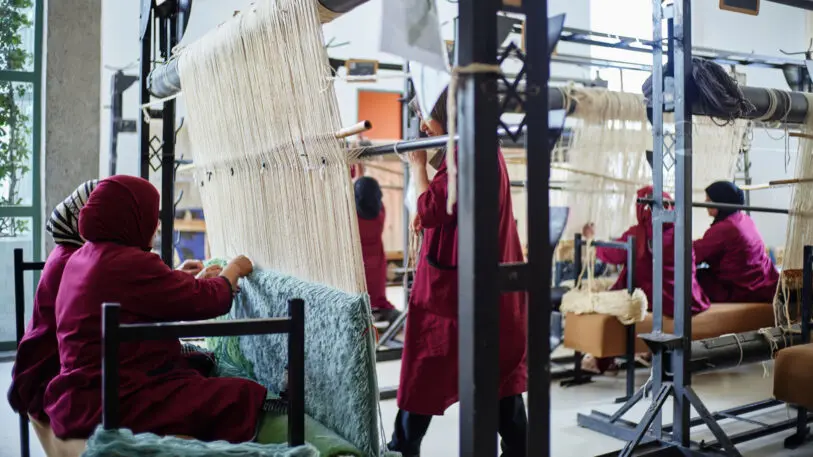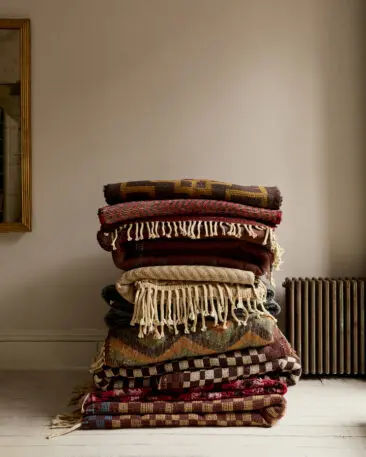Rachida Ouilki, 65, first learned to weave from her mother when she was eight years old, in their home in a village outside Marrakesh, Morocco. She left school at the age of 10, like many little girls in her area, so she could help out at home. But in her spare time, she continued to enjoy rug-weaving. “My father provided for the family,” she tells me through a translator. “But any money we made by selling our rugs at the market we could keep and save for ourselves.”
Years later, when she was married, she found herself in a difficult position. Her husband went blind from diabetes complications and struggled to find employment. Ouilki decided to put her rug-making skills to work. She spent her days weaving, earning enough to support her family. And at the markets, she developed a reputation for being one of the best weavers in the area.

Today, Ouilki is a key player in the five-year-old American startup, Beni Rugs, which creates chic rugs that blend traditional Moroccan artisanship with aesthetics that appeal to Western consumers.
The brand has been praised in the design world—publications including Architectural Digest and Vogue offer glowing reviews of the rugs. Tom Delavan, the design/interiors director of T: The New York Times Style Magazine and an interior designer himself, is such a fan of the brand that he recently collaborated with Beni to create a capsule collection of rugs.

Beni is the brainchild of Robert Wright, an e-commerce veteran, and Tiberio Lobo-Navia, an artist and former hotel executive. In 2017, the two had been on a photo shoot in Marrakech for another brand when they stumbled across a market that sold traditional Moroccan rugs, known as Beni Ouirains. These rugs, which have been hand-woven for hundreds of years, have a thick, fluffy, shaggy pile and often feature geometric designs. Since many tribes in the region are nomadic, people sometimes carry their rugs with them as they traveled, using them to provide warmth in the winter. “We fell in love with these rugs,” says Lobo-Navia. “We basically abandoned the photoshoot and decided how we could create a business around these rugs.”

As they discovered how these rugs were woven, they became fascinated with the supply chain. They learned that they were made from the wool of local sheep and that highly skilled artisans—the vast majority of whom are women—wove the rugs in their own homes, using their own creativity to modify ancient designs. “We wanted to bring authentic Moroccan rugs to the United States, but we also wanted to tweak the designs slightly to make them palatable to a Western consumer,” says Wright.

They started a small operation selling the rugs online in 2017, working with a few local weavers. But over the next two years, they set out to build their own supply chain. They found an 8,000-square-foot space in Tameslouht, Morocco, not far from Marrakech. They set up 50 looms and fashioned the space to be more than a factory: It’s a beautifully designed studio, adorned with modern paintings, sculptures, and furniture, along with many rugs. There’s a little library on site, where weavers can thumb through design books for inspiration. Now, both Wright and Lobo-Navia spend most of the year in Morocco.

While the space is modern, it lives in the context of a country that still abides by very traditional values. Expert weavers are women who tend to weave at home, in the breaks between taking care of their families. So Wright and Lobo-Navia needed to find someone who could help find weavers who would be interested in being part of this new company. That’s how they found Ouilki. “The founders had come to the market, asking if the vendors knew anyone who was an experienced weaver,” she says. “By then, I was well-known because I had been running my own business for years.”

Ouilki has helped the founders gather a group of between 60 and 65 women who now work at the factory. “The number fluctuates because women sometimes have to return to their family responsibilities,” says Wright. “They might stay to weave a rug, which takes about four to six weeks. Then they’ll go back home.”

The founders have focused on giving these weavers very good working conditions. They provide transportation to and from the studio, childcare, and help them secure government benefits, which allows them to get healthcare. They are paid twice the rate of other Moroccan weavers. “Our goal was to create a nice working culture here,” says Lobo-Navia.
They’ve succeeded, says Reto Aschwanden, managing director of Label STEP, a fair-trade nonprofit that is focused on the well-being of weavers and workers in the handmade-carpet industry. Aschwanden visits weaving facilities all over the world, from India to Turkey to Morocco, as part of STEP’s program, which certifies supply chains to be fair trade. He says that Beni Rugs is one of the top three weaving factories he’s ever visited, describing its working conditions as outstanding.

“What’s so remarkable is that the company has built such strong trust in this community that families are willing to let their wives, sisters, and daughters travel to work there,” Aschwanden says. “In many places in the world, men don’t let women leave the house, partly because it simply isn’t safe. And by earning a decent income, these women have more power in their communities.”

And while Aschwanden says there are benefits to women working from home, allowing them to generate income while also fulfilling their domestic responsibilities, Beni’s model provides these women with a different kind of freedom. “Some women are eager to leave the home, and this model allows them to do just that,” he says. “They can meet new people, learn about life in other countries. This opens the world to them.”

Wright and Lobo-Navia want the weavers to see this as more than just a source of income; they want them to find the work creatively fulfilling. So every weaver who joins the studio first gets an opportunity to weave a rug for herself, creating any design she likes. (She is paid for this work, as if it were going to be sold.) “There’s one woman weaving a rug for her daughter right now,” says Ouilki.

The New York Times’ Delavan says that all of Beni Rugs’ designs are a collaboration between the weavers and Western designers. “The Beni team is aware of the [Western] market, but the weavers are aware of the history of these rugs,” he says. “It’s a beautiful interplay.”

Colin King, another designer who has worked with Beni on four collections and is the brand’s artistic director at large, has created a more modern collection of rugs with floating geometric shapes. Delavan’s collection was inspired by traditional Turkish patterns known as Tulu, featuring zigzags and rectangles. They come in saturated colors, like deep teal and burgundy. He favors looser patterns that allow you to see the intricacies of the hand-made nature of the weaving. “My goal was to stay true to the principles of design that have governed the making of these rugs for centuries, but to make them look stunning in a Western home,” he says.

Ouilki, for her part, says that art of rug making is always in flux. Weavers like herself are bringing their own point of view to the craft, even as they weave traditional patterns. “I’m always finding ways to improve on the rug-making technique, to create even more beautiful designs,” she says, pointing out that she can’t share some of the unique techniques she’s brought to Beni. “It’s our secret formula.”
In the modern studio that Beni’s founders have created, the weavers bring their own culture and traditions. Whenever a weaver completes a rug, they sound a bell so everybody can celebrate together. They share a communal couscous meal at lunchtime. And Wright says that when the founders make a happy announcement, such as sharing about a pay increase or a special treat for a Moroccan holiday, the weaving team will spontaneously break into a soulful, happy song drawn from the long tradition of Bedouin music. “Without fail, I cry,” he says. “Their singing is just so deeply moving.”
Recognize your brand’s excellence by applying to this year’s Brands That Matter Awards before the final deadline, June 7.
Sign up for Brands That Matter notifications here.
